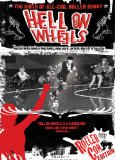| Reviews & Columns |
|
Reviews DVD TV on DVD Blu-ray 4K UHD International DVDs In Theaters Reviews by Studio Video Games Features Collector Series DVDs Easter Egg Database Interviews DVD Talk Radio Feature Articles Columns Anime Talk DVD Savant Horror DVDs The M.O.D. Squad Art House HD Talk Silent DVD
|
DVD Talk Forum |
|
|
| Resources |
|
DVD Price Search Customer Service #'s RCE Info Links |
|
Columns
|
|
|
Hell On Wheels
"We started this company as communists! We wanted everybody to run the company! We tried it. And it failed miserably!" Anya.
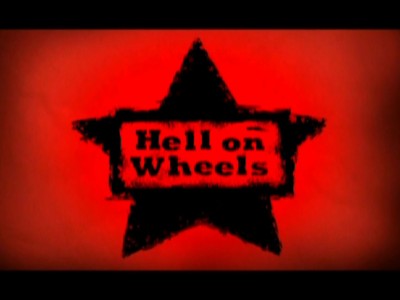
From your lips, Anya, to Washington's ears. Indiepix has released Hell on Wheels, the 2007 documentary by Bob Ray about the formation (and disintegration) of the BGGW ("Bad Girls Good Women") roller derby league in Austin, Texas. While ostensibly a doc concerning the resurgence of the much-beloved full-contact "sports entertainment" roller derby, Hell on Wheels is much more interested in chronicling the eventual power play that occurs when what starts out as a bunch of women getting together to have some fun, evolves into a potentially big money-earner, with skaters turning into owners - and the rest of the skaters turning on the new owners.
After a brief, satirical overview of the history of roller derby in America (developed in the 1930s by showman Leo Seltzer, the "sport" took off in WWII, becoming a TV staple in the 1960s, only to die off by the mid-70s), Hell on Wheels begins in Austin, Texas, in 2001. A shady promoter, Dan Policarpo (aka "Dan Francisco," aka "The Devil," aka "Roller Derby Dan"), decides to form a league, choosing four women he's met in a bar as the team captains: Heather Burdick, April Herman, Anya Jack, and Nancy Haggerty. Team names were chosen (The Holy Rollers, Putas de Fuegos, The Rhinestone Cowgirls, and The Hellcats), other skaters were signed up, a lot of b.s. went down from "The Devil," and the whole "league" blew up in the women's faces when Dan skipped town. Not wanting to abandon the idea of roller derby, the four team captains decide to go it alone, inventing the BGGW, with the intent of running the business with no men involved, and as a way to empower women while bashing each other out on the flat track.
Eventually, though, many of the league skaters begin to balk at not only the money they were continually asked to contribute in the form of dues (when they were paid no money for their participation), but also at the prospect of the four team captains incorporating BGGW, with the captains installed as absolute owners of the league. The derbies played to bigger and bigger crowds; league-related merchandizing started to move, and real business fat cats started looking at the league with interest - with everybody starting to smell money. So when the skaters started to put demands on the four owners (like insurance for injuries and either a piece of the action or some salaries), the so-called "feel good" times were over, and push came to shove when many of the skaters broke off to form their own "illegal" league. And that's when the fun really started.
SPOILERS ALERT!
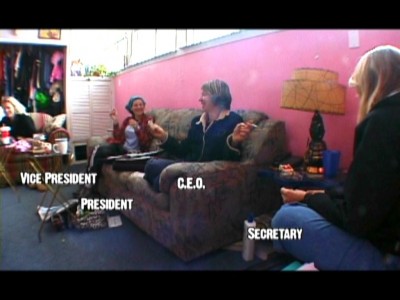
As one of the generation who grew up on the very last vestiges of the classic televised roller derby leagues back in the early seventies, I can assure you that it was a welcome component of the typical local Saturday afternoon TV one-two punch, following old-school professional wrestling. It was obviously fake, and at times slightly surreal, just like professional wrestling (I always loved the "At Home" segments with the players...that they taped out in the parking lot). But there was no denying that during those programming-starved days of pre-cable TV, just about anything looked good on the tube to a kid on a rainy afternoon, particularly if it was as visually interesting as roller derby. There was something about the monotony of the players skating around and around that banked track, punctuated by exaggerated fake punches and kicks and falls, that lulled you into some kind of torpid fascination. It wasn't good TV or even good entertainment, but you watched it.
That being said, I have to admit that I was unaware of this resurgence of roller derby, now enacted by do-it-yourself grassroots leagues all over the country (which I suspect, if this reinvention has been successful, is getting less and less "grassroots" and more and more "professional" - i.e.: big money - all the time). As it's chronicled here in Hell on Wheels, it seems apparent that the core of the movement seems to attract and be driven by the punk and tattooed "rocker chick" subculture (as stated by several interviewees in the film), where issues of empowerment and "getting back in touch with one's own violence," as one of the women states, are bandied about with the pleasure of just getting out on the track and smashing into each other. Additionally, elements of camp and burlesque have been introduced into the "sport," with the notion (perhaps read into the movement by those who want to see it there) that these themes are exaggerated to comment ironically on a mainstream society these "fall-through-the-cracks" women neither emulate nor particularly like.
Be that as it may, Hell on Wheels doesn't really delve directly into those issues (I wish it explored the culture of the skaters more), preferring to chronicle the nuts-and-bolts in-fighting that occurred when the BGGW league started to implode in 2002 during a skater/owner power play. It's not particularly interested in the "sport," either, with surprisingly few sequences actually showing the women competing. Which, as it turns out, is okay anyway, because...they're not very good. Perhaps the level of athleticism - as well as the necessary theatricality - has progressed in the seven or eight years since the events chronicled in Hell on Wheels, but by the admission of many of the women involved here, few of the skaters were true athletes nor even skaters when they started, while the team captains/owners themselves seem shaky on even the most rudimentary aspects of the game. Operating on the flat tracks (at the beginning of the league) doesn't help a whole lot, either. A fundamental appeal of the original banked track roller derbies was the power and speed the old pros could summon up when they'd whip around those curves, slingshotting each other into the skulls of their opponents, or, waiting vulture-like at the top of a banked curve, swooping down and drop-kicking an opponent right in the breadbasket (or even better: careening up and over the rails, to smash spectacularly into the seats). On these small roller rink floors, with sad little cones and light strips laid out to demarcate a track, these non-skaters look frankly comical, falling all over each other as they putter slowly around the track, executing lame wannabe moves that fail to connect with the flailing, falling mob.
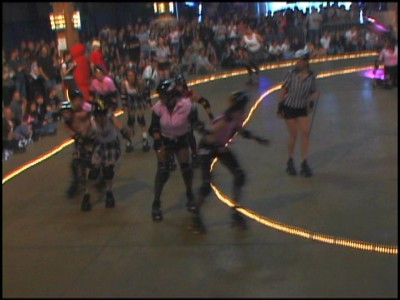
Hell on Wheels instead concentrates on the timeline of the league's inception and break-up (and apparent reconstitution), which is compelling storytelling in and of itself. It's fascinating to watch the owner/managers go from amateur boosters, looking for an outlet for their interests (as well as disinterests, if you will, for mainstream society), to amateur businesswomen who didn't, according to one interviewee, have too many smarts when it came to growing a hobby into a business. There's a feeling of almost inevitable dread as you watch the women, particularly the aggressive, abrasive Anya, fail to see how their actions will be regarded by the other women whom they eventually come to view as employees, not friends (the foul-mouthed Anya probably comes off the worst here, with the rush of controlling power going straight to her head). Absolute, unyielding power becomes the main motivator for the owners, even more than money (since their decisions clearly weren't in the best interest of keeping the growing league going), when they turn away the other skaters' concerns and demands to the point where the women break off and form their own league under their own more democratic ideals. Some might say this is ultimately the triumph of what the original BGGW owners were attempting; that the new Texas Rollergirls league did what they couldn't do: include the skaters in decision-making. But we really don't know too much about the newly formed league, nor how it was set up, so we can't say if it's truly democratic, or socialist, or communist, for that matter.
I wish the filmmakers had looked more closely at the obvious ironies and contradictions presented by the women in Hell on Wheels, particularly their views on sexual politics, or as they put it, "sexy versus slutty." One of the more ridiculous aspects of the new derby - the "penalty wheel" - is employed when a player fouls, and one of the penalties includes the "Spanking Alley," where the player has to skate by the crowd (mostly men) and get spanked by them. During one of the jams, a player has to endure this humiliation when a spectator grabs her crotch. This is too much for the "Penalty Mistress," who tells the crowd that's the difference between slutty and sexy, and evicts the offender. Unfortunately, no one involved with the production of the film explores this theme, which would seem to offer a rich source of commentary (and perhaps some uncomfortable irony, as well, for its proponents) of the sexual politics involved with this new roller derby culture. How is it empowering for women to dress up like Catholic school girls and wrangle around on the ground, with the possibility of getting spanked by the men in the audience as a treat for the audience and a penalty for the woman? Hey, maybe it is (you could, I suppose, use that now-old saw about feminism-as-societal mocker, but it's a tough sell), but we can only guess how they're connected, because the film won't explore this or other intriguing issues (I would have loved to see someone comment on Anya's truly warped statement that the tragic suicide by their "penalty mistress" is a "decision that needs to be respected," but the camera blithely records it and moves on). Other ironic issues, such as the dichotomy of the decidedly "anti-male" attitude of the original owners, with those same owners praising the "god-send" of a male buisness advisor who pulls the BGGW out of its tailspin, aren't explored, either, leaving Hell on Wheels, ultimately, as a missed opportunity.
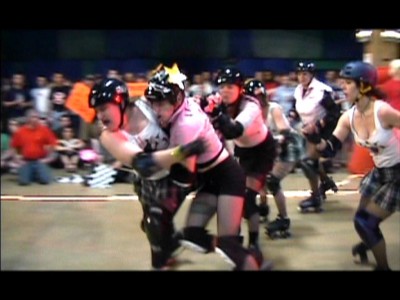
The DVD:
The Video:
The non-anamorphic, 1.66:1 widescreen image for Hell on Wheels (which looks like it was shot on HD video), isn't the greatest, with plenty of aliasing (jaggies on everything), along with macroblocking on the darker scenes. Colors are grungy, and video noise is apparent, although this "look" probably suits the subject matter better than if this was glossy and pretty looking and anamorphic.
The Audio:
The English 2.0 stereo audio mix is adequate when the music cues blast on, but some of the dialogue can get a bit mushy (which may be attributed to the original recording sources). There are no subtitles or close captions.
The Extras:
Extras include a commentary track by the director, producer, and several of the participants in the film (it's lively, I'll give it that), while music videos for USS Friendship and Nashville Pussy are also included. As well, there are over an hour's worth of deleted scenes -- some of them quite interesting, particularly if they had made the final cut.
Final Thoughts:
It's not that the subject matter of the Hell on Wheels documentary - the resurgence of roller derby in Austin, Texas courtesy of some rowdy punk/rocker chicks - is uninteresting. It's just that quite a few potentially intriguing ideas and themes go unexplored as the doc settles in to chronicle the rise and fall (and rise again, apparently) of the BGGW League. It's an interesting story in and of itself, but Hell on Wheels could have had more impact had it looked beyond the obvious dramatic appeal of the owner/skaters' power plays. A rental would be best for Hell on Wheels, but only if you're interested in the subject matter.
Paul Mavis is an internationally published film and television historian, a member of the Online Film Critics Society, and the author of The Espionage Filmography.


|
| Popular Reviews |
| Sponsored Links |
|
|
| Sponsored Links |
|
|
| Release List | Reviews | Shop | Newsletter | Forum | DVD Giveaways | Blu-Ray | Advertise |
|
Copyright 2024 DVDTalk.com All Rights Reserved. Legal Info, Privacy Policy, Terms of Use,
Manage Preferences,
Your Privacy Choices | |||||||









